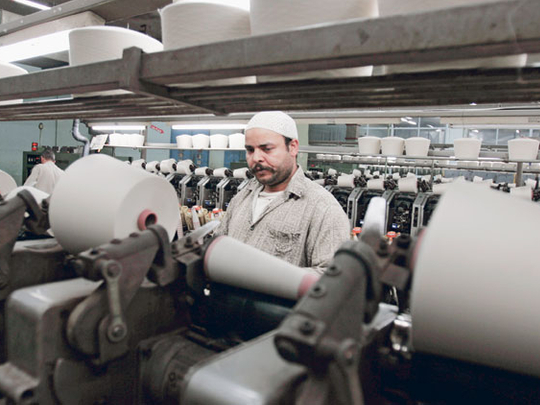
Cairo: Back in the 1990s one of Egypt's top economic priorities was the privatisation of state-owned industries, as Egypt tried to free itself from a failing, centrally controlled economy.
But the government's enthusiasm waned over the years, and last month the government quietly announced that the sale of state assets to individual investors had effectively ended.
The act of selling state companies had become radioactive because of resistance from a sceptical public that believed that the transactions were riddled with corruption and insider dealing as well as from powerful old-guard officials who equated the status quo with stability, Egyptian economists and government officials say.
In addition, they said, most of the likely candidates had either been privatised or dissolved, leaving hard-to-sell industries that were technologically outdated and overstaffed with ill-trained workers.
And then came the protests. In recent months, thousands of workers have staged demonstrations outside parliament complaining about the loss of jobs, wages and social protections, often in connection with businesses that have been sold. With so much turmoil, and with parliamentary elections this autumn followed by a presidential election next year, the political calculus was obvious, officials said.
Rising headache
"The value became less than the headache," said Abdul Munem Saeed Ali, chairman of Al Ahram, a state-owned media group, publishing house and research organisation. "The whole cabinet decided to forget it."
The announcement had little practical impact, in part, because it formalised what had already occurred. In the past four years, Egypt sold only seven companies while actually buying back seven from investors, said the Ministry of Investment, which oversees the process.
"I am surprised they announced it openly, even though de facto there had been a suspension for a while," said Ragui Assad, an expert on Egypt's economy at the Humphrey Institute of Public Affairs of the University of Minnesota. "That, to me, seems an attempt to make a concession to all the protesting workers, with the government saying, ‘We are protecting your rights'."
Indeed, it appeared as though the statement was the equivalent of a white flag waved by Prime Minister Ahmad Nadeef's cabinet. Having been appointed in 2004 with the mandate to repair a moribund economy, Nadeef's team has "lost momentum," said Saeed Ali. "Now it seems they don't know what to do next."
The government made a fundamental mistake, experts say, in failing to reset public expectations fashioned decades ago when the state was the primary provider. Even today, there are about six million civil service employees, Assad said.
"That is the brake on reform," said a government official who spoke on the condition of anonymity so as not to offend the public. "They have grown up with the state doing everything, ‘You educate me, give me a degree, you give me a job, when I die you bury me — and I do nothing'."
The uneven nature of Egyptian reform meant, for example, that while the government worked on the economy it neglected retooling an inadequate education system that at its best was intended to prepare graduates to work for the government. One consequence is a shortage of qualified workers in a country with high unemployment.
"Mismanagement is the essence of the problem," said Amr Al Shubaki, a political scientist at the Ahram Centre for Political and Strategic Studies. "People aren't genetically incapable of working."
Al Shubaki and others said that privatisation was a way for the friends of the rich and powerful to grow more rich and powerful. Even the government acknowledges that the econ-omic changes have had little impact on average lives.
Privatisation began in earnest in 1991, when Egypt agreed to work with international lenders on an economic restructuring plan to help it repair a failing economy. This represented an effort to accelerate changes started in the 1970s by President Anwar Sadat, who began the process of dismantling the state-controlled economy fashioned by President Jamal Abdul Nasser in the 1950s and early 1960s.
The 1991 effort started off easily enough when the state readily found buyers for assets like its beer and cement industries. But over time, the state said it was left with difficult-to-sell assets, outdated factories producing cars, instruments for textile manufacturing and other things that are either obsolete or unwanted. At the same time public pressure became intense as workers complained that their rights were being auctioned off. The goal was originally to sell off 314 companies. There are 150 left: The rest have been sold, gone public on the stock market, dissolved or merged with other state industries.
"There is always a cost for reform, but the problem here is that people now have the impression that those who always pay the cost of every reform are the simple people, while businessmen are never held accountable for corruption and while privatisation of companies takes place in secret, without the knowledge or participation of the people," Al Shubaki said.
Foreign investment
Faced with so many obstacles, the government took another approach, trying to open the door to foreign investment while quietly allowing state industries to wither.
In the Egyptian context, economists say it is a victory that this work force has shrunk, to about 300,000 from about 1.3 million in 1978. The government also adopted a law that allowed state-owned companies to deal with employees in the same way as private-sector companies. This year it began to carry out a new law allowing the private firms to build infrastructure, including sewage plants and hospitals, another unpopular move intended to whittle away the state-dominated system.
But even those in a position of authority acknowledge that these moves are, at best, incremental. They understand that the next big change that will probably occur is a new president to succeed Hosni Mubarak, 82, who has served for nearly 30 years.












